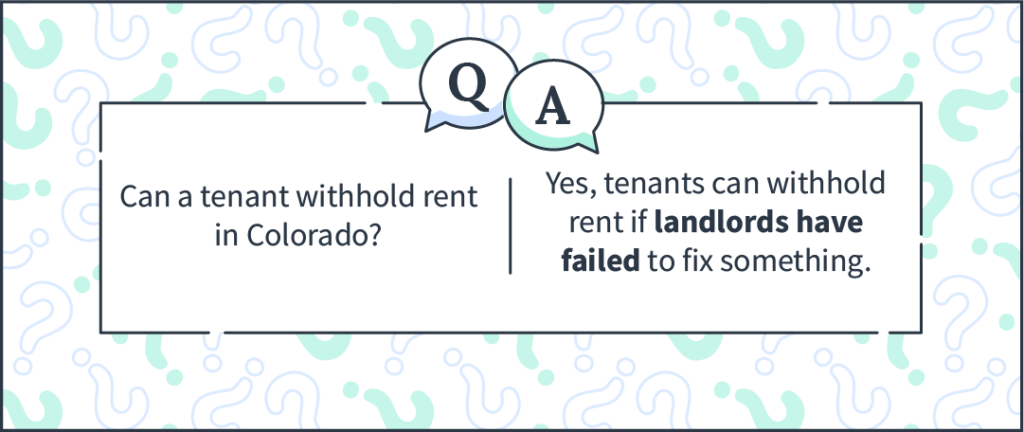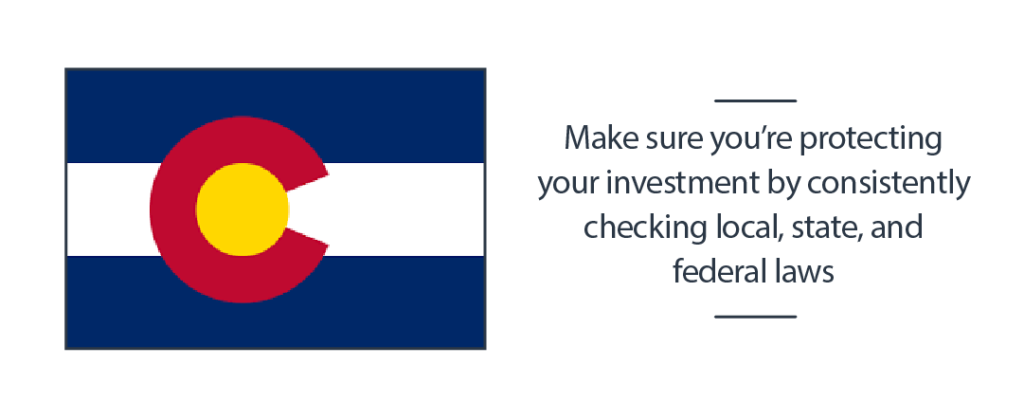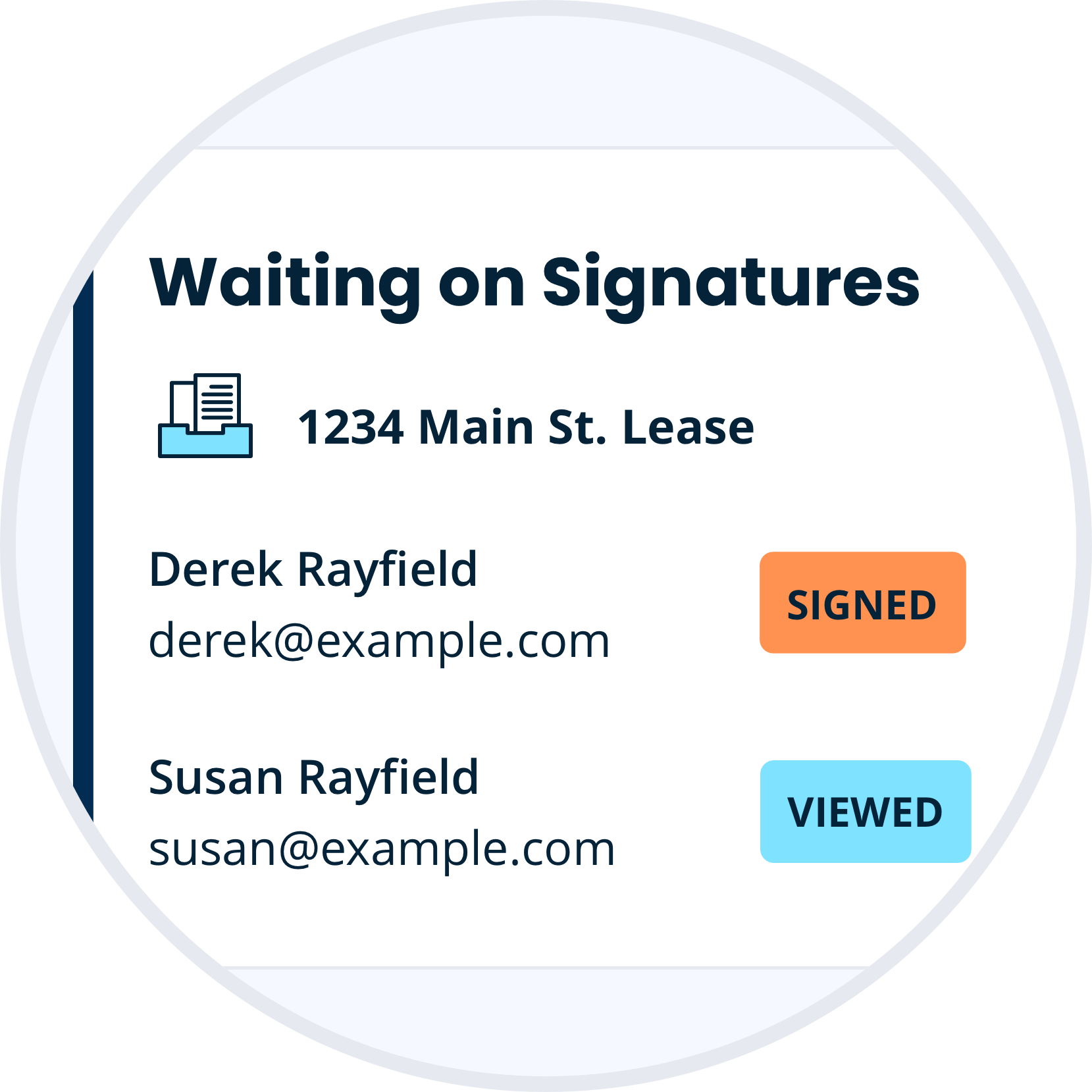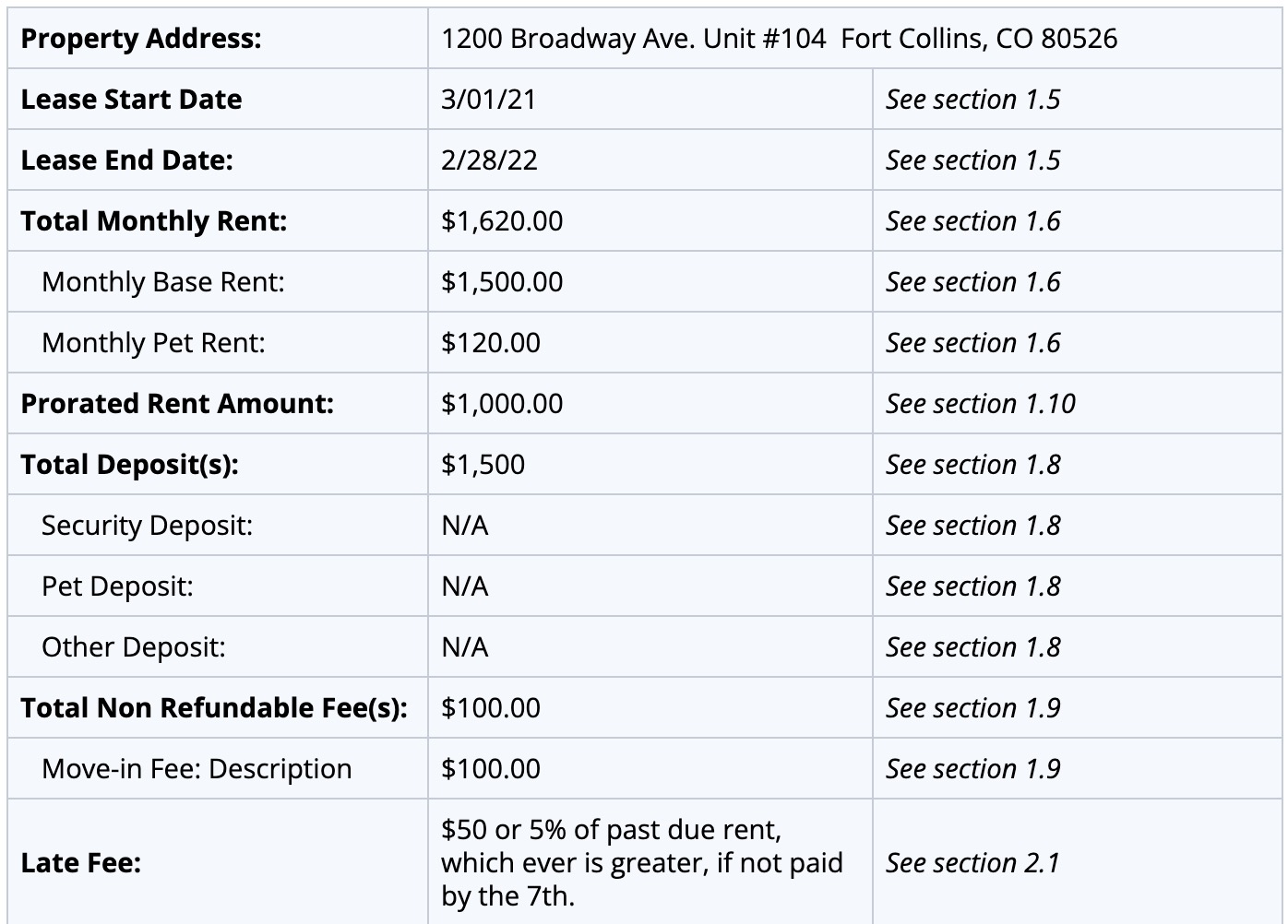Table of Contents
- Colorado Renters’ Rights and Landlord Responsibilities
- Colorado Landlords’ Rights and Tenant Responsibilities
- Application Fee Laws
- Criminal Background Checks
- Fair Housing
- New 2023 Colorado Law Alert
- Colorado Lease Agreement
- Colorado Landlord-Tenant Law FAQs
- Due Diligence and Landlord-Tenant Laws in Colorado
- General Colorado Landlord-Tenant Law Resources
Everyone wants to live in Colorado – this is evident in the increasing population and steady employment growth. It’s not a surprise people are flocking to the Centennial State as it is sunny 300 days out of the year, has beautiful mountains perfect for hiking or skiing, world-renowned breweries, and has a great culture. The average number of days a unit is available on the rental market is 12, while the increase in home values is high at 7-10%. Laws that impact the rental market, landlords, and tenants are constantly being decided, and it’s important to have a solid lease agreement to help you navigate changes as they arise.
Laws that impact the rental market, landlords, and tenants are constantly being decided in states. Make sure you know what’s on your ballot – find Colorado voting information.

Colorado Renters’ Rights and Landlord Responsibilities
- Return security deposit within 60 days
- Give 10 days notice to raise the rent for month-to-month
- Tenants are allowed to withhold rent if the landlord fails to fix something
- Tenants can sue up to $7,500 for the return of security deposits
When it comes to Colorado rental laws, there are a few specifics landlords need to know:
- Security Deposits – Landlords must return the security deposit within 60 days maximum, depending on the lease terms. It’s important to remember there is no state limit on how much landlords can charge for a security deposit, but local governments might have caps in place.
- Rent Raises – Landlords must give at least ten days notice in month-to-month leases with proper written notice to the tenants. There are no rent controls in Colorado, so landlords are allowed to raise the rent.
- Rent Withholding – Tenants may withhold rent if landlords fail to fix necessary appliances, such as the fridge or water heater, which would breach the warranty of habitability. Tenants must give landlords a written notice of ten days of their intent to withhold rent.
- Small Claims Lawsuits – Tenants can sue landlords to return security deposits up to $7,500. Landlords need to remember the Colorado deadline is one month for the return of the tenant’s deposit unless the lease specifies something different (it cannot be more than 60 days).
- Rental Applications – Landlords can’t consider arrest or conviction records for more than 5 years before the application date, except for convictions and deferred judgments for drug (certain), sex, homicide, and stalking offenses. A landlord who violates this statute is liable to a person who is charged a rental application fee for treble the amount of the fee, plus court costs and reasonable attorney fees unless the violation is corrected within seven days of receiving notice.
Colorado Landlords’ Rights and Tenant Responsibilities
- Rent is considered late if not paid by the seventh day. A late charge may then be added at 5% of the rent amount or $50, whichever is greater.
- Landlords can issue an unconditional quit notice.
- Tenants must claim any abandoned property within 30 days.
- You cannot discriminate and refuse to rent to victims of domestic violence.
- Evictions – If a tenant has failed to pay rent or has otherwise violated the lease, the landlord must give the tenant a ten-day notice. Tenants must pay rent within three days after receiving notice, or landlords may terminate the lease and begin filing for eviction.
- Unconditional Quit – Tenants must abide by all terms of the lease, or landlords may issue an unconditional quit notice to move out immediately, which means the landlord doesn’t have to allow the tenant to fix the violation. If tenants don’t move out after three days, then landlords can file an eviction lawsuit.
- Abandoned Property – Tenants must claim any abandoned property within 30 days of the last contact, or landlords may dispose of the property as they see fit. Landlords are also legally able to sell a tenant’s abandoned property to cover what the tenant might owe them as well.
- Property Maintenance – Tenants must keep the property clean and undamaged and immediately alert the landlord to any serious maintenance issues. If landlords don’t take care of important repairs, tenants have the right to withhold rent.
- Special Protections – It’s illegal to discriminate against someone and not rent to them if they are victims of domestic violence. Make sure you notify law enforcement of potentially dangerous tenants or situations.
Application Fee Laws
No additional laws.
Criminal Background Checks
There’s a five-year limit on criminal history.
Fair Housing
Colorado has added protections based on:
- Military status
- Ancestry
- Sex orientation
- Gender identity
- Ownership of a service animal
New 2023 Colorado Law Alert
Portable Screening Reports (HB 23-1099)
Landlords have to accept a screening report that was pulled within the last 30 days from an applicant. The applicant has to confirm that no changes have been made with regard to their:
- Name
- Address
- Bankruptcy status
- Criminal history status
- Eviction history status
If a portable screening report is used, an application fee cannot be charged. This law became effective as of 8/7/2023.
Radon Disclosure (SB 23-206)
- There must be a statement in the lease on the notification of and the health risks associated with radon presence.
- Landlord must disclose if they have knowledge of any radon present on the property, including:
- The levels found
- The remediation system put in place
- All records of past readings
- A link to brochure provided by the Dept of Public Health and Environment
Environmental Public Health Event (HB 23-1254)
In the event of an environmental public health event (such as a flood, wildfire, or toxic spill) that affects residents:
- The tenant must notify the landlord in the event of inaccessibility to the property due to an environmental public health event.
- The landlord has 24 hours to respond to this notice and 72 hours to respond offer a timeline and plan for remediation.
- The landlord must, at their expense:
- Provide alternative housing during remediation
- Remediate the property within a reasonable time, given the nature of the damages
- Tenant can terminate the lease if:
- They have given proper notice to landlord; and
- Landlord has not provided alternative adequate housing; and
- Landlord has not remediated the property within 60 days
- If the tenant is among the vulnerable population (aka people with disabilities, the elderly, children, etc.), a doctor’s note must be provided stating living on the premises is not conducive to their health in order to break their lease.
Pet Ownership and Eviction (HB23-1068)
Landlords cannot charge more than $300 as an additional pet security deposit, and that fee must be refundable. Also, tenants cannot be charged more than $35 or 1.5% of rent as additional pet rent. During an eviction, no animals may be left unattended on the premises.
- If the tenant is present when the writ is carried out, all animals must be surrendered to them.
- If no tenant is present, local animal control is to be called, and the landlord must provide them with the tenant’s name and contact information.
- Then the landlord must post the local animal control’s contact information and address in a conspicuous place.
Lastly, insurance carriers cannot inquire about or deny insurance policies based on the breed of a tenant’s pet, unless it is known to be or declared a “dangerous animal.”
CO HB 23-1233 – Electrical Charging Stations
Landlord of multi-family housing must allow tenants to install, at their own expense, a vehicle charging station for electrical vehicles on their assigned space or in a general parking area. Build a Colorado lease agreement in less than 15 minutes.
Colorado Lease Agreement
There are three sections to a residential lease agreement. The first section outlines the custom details of the contract, such as who’s involved and for what address. Here’s an example Colorado lease agreement listing details found in Section 1:
Colorado Landlord-Tenant Law FAQs
Below are answers to some of the most commonly-asked questions when it comes to landlord-tenant laws in Colorado:

Can a Tenant Withhold Rent in Colorado?
Yes, tenants can withhold rent in Colorado if the landlord has failed to fix something vital such as a water heater. Tenants have to give written notice to their landlords ten-days in advance with their intent to hold rent.
How Long Does it Take to Evict a Tenant in Colorado?
Generally, it will take about 25 days. Please visit the state’s website to get full details for specific scenarios.
Is Colorado a Landlord-Friendly State?
Colorado is generally a landlord-friendly state where landlords can charge rental application fees and collect security deposits. Make sure to always check local area laws along with state laws to ensure you’re fully educated.
What is the Eviction Process in Colorado?
When there is a lease violation, such as failure to pay rent, landlords must give the tenant a ten-day notice. Tenants have the option to pay rent within three days, or the landlord will file for eviction. Here is a full guide on how to evict a tenant, but make sure to check our resources below for Colorado-specific laws.
How Much Notice Does a Landlord Have to Give a Tenant to Move Out in Colorado?
A landlord needs to give a written notice to the tenant to move-out allowing 21 days for the tenant to vacate – specifying the exact date on when the tenancy will end.
What is a rental agreement in Colorado?
Also known as “Lease Agreements,” a rental agreement is an important legal contract that landlords create for leasing their commercial or residential property in the state of Colorado. This document serves to outline all responsibilities and rights between all parties involved.
Due Diligence and Landlord-Tenant Laws in Colorado

TurboTenant has utilized many municipal sources along with official state statutes in order to compile this information to the best of our ability. However, local laws are always in flux and landlords and tenants alike should be sure to do their due diligence and consult legal help when it’s needed. We hope the following list can serve as a valuable resource and allow you to succeed as a landlord or tenant in Colorado. Be sure to take proper precautions when it comes to finding the top candidates for your unit by utilizing our online rental application and tenant screening services.

Unlimited Everything.
Create a single California lease agreement, or subscribe and receive unlimited lease agreements, landlord forms pack, and e-signs for a simple annual fee. Be confident with all the legal forms and tools you need as a professional landlord.
Discover Our Unlimited PlanGeneral Colorado Landlord-Tenant Law Resources
- Colorado State Security Deposit Law
- Security Deposit Video Presentation (13 min) Presented by Colorado Legal Services
- Colorado Renters Guide
Colorado Fair Housing Resources
- Colorado Dept of Local Affairs Fair Housing
- Colorado Dept of Regulatory Agencies (DORA) Civil Rights Division
- HUD in Colorado
- Tenant Rights, Laws, and Protections: Colorado
Other Colorado State Resources
Federal Fair Housing Resources
- Federal Fair Housing Act
- United States Department of Housing and Urban Development (HUD)
- Civil Rights Act of 1968 (Wikipedia)
City-Specific Housing Resources
Denver
- Landlord / Tenant Resources – University of Denver
- Fair Housing – City and County of Denver
- Denver Metro Association of REALTORS®
Colorado Springs
Aurora
Fort Collins
- Landlord/Tenant Handbook – City of Fort Collins
- Fair Housing – City of Fort Collins
- Fort Collins Board of REALTORS®
Lakewood
Thornton
Pueblo
Arvada
Westminster
- Fair Housing – City of Westminster
- Rental Property Maintenance Inspection Program – City of Westminster
- Denver Metro Association of REALTORS®
Boulder
- Landlord/Tenant Handbook – City of Boulder
- Rental Housing Licensing– City of Boulder
- Security Deposits – City of Boulder
- Boulder Area REALTOR® Association
Greeley
- Off-Campus Life Handbook – University of Northern Colorado
- The Lease – City of Greeley
- Greeley Area REALTOR® Association
Longmont
- Rental Property Handbook for Landlords and Tenants in the City of Longmont – City of Longmont
- Longmont Association of REALTORS®
Disclaimer: TurboTenant, Inc does not provide legal advice. This material has been prepared for informational purposes only. All users are advised to check all applicable local, state, and federal laws and consult legal counsel should questions arise.





